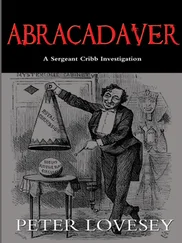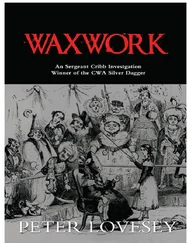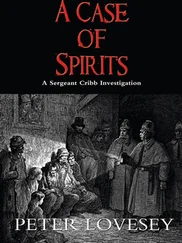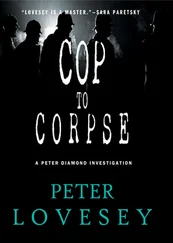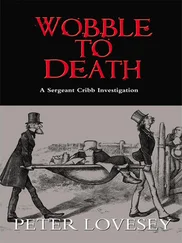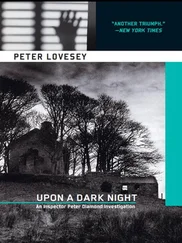Peter Lovesey - Rough Cider
Здесь есть возможность читать онлайн «Peter Lovesey - Rough Cider» весь текст электронной книги совершенно бесплатно (целиком полную версию без сокращений). В некоторых случаях можно слушать аудио, скачать через торрент в формате fb2 и присутствует краткое содержание. Жанр: Криминальный детектив, на английском языке. Описание произведения, (предисловие) а так же отзывы посетителей доступны на портале библиотеки ЛибКат.
- Название:Rough Cider
- Автор:
- Жанр:
- Год:неизвестен
- ISBN:нет данных
- Рейтинг книги:4 / 5. Голосов: 1
-
Избранное:Добавить в избранное
- Отзывы:
-
Ваша оценка:
- 80
- 1
- 2
- 3
- 4
- 5
Rough Cider: краткое содержание, описание и аннотация
Предлагаем к чтению аннотацию, описание, краткое содержание или предисловие (зависит от того, что написал сам автор книги «Rough Cider»). Если вы не нашли необходимую информацию о книге — напишите в комментариях, мы постараемся отыскать её.
Rough Cider — читать онлайн бесплатно полную книгу (весь текст) целиком
Ниже представлен текст книги, разбитый по страницам. Система сохранения места последней прочитанной страницы, позволяет с удобством читать онлайн бесплатно книгу «Rough Cider», без необходимости каждый раз заново искать на чём Вы остановились. Поставьте закладку, и сможете в любой момент перейти на страницу, на которой закончили чтение.
Интервал:
Закладка:
Mr. Lockwood released me and held up his mug to me. I believe he said, “Have a drop more, boy. Finish it for me.”
Somerset cider has a notorious kick. Barbara tried to protest, but it was reckless to challenge the farmer’s authority in front of his men and the extra hands hired for the harvest. He silenced her with a growl, still holding the mug with the handle towards me.
I won’t claim that I felled my Goliath with one shot, but for a nine-year-old, I stood the test reasonably well. I told him I didn’t have much of a thirst. I took a sip, felt the bite of the cider on my tongue, handed back the mug, and asked politely if I could stay and help and drink the rest later.
This met with general amusement and, more important, a nod from Mr. Lockwood. When work resumed, I was hoisted to the top of one of the trailers to help load the sheaves as they were forked up.
My memories are patchy. Little else of that afternoon remains. I think Barbara must have taken me back to the farmhouse when it was obvious that I was used up. She was certainly there at the end of the day, because she came into my bedroom and told me her father had said I could stay. She put out her hand and smoothed back my hair. I have a clear recollection of the touch of her fingertips.
After that the days blur, subdued by the routine of farm and school. I’ll leave out my impressions of the Somerset education system. You want to know how I met Duke Donovan, and that’s what I’m coming to next.
To compensate for my ignorance of country ways, I told a few tall tales to my classmates about life in wartime London, the unexploded bomb in our garden, the Messerschmitt that crashed into a barrage balloon, and the undertaker with the glass eye who was known to be a German spy. They hung on every word. The only enemy action they’d experienced was the distant thud of the bombs on Bath in the Baedeker Raids the year before. Otherwise, the best they could claim was an occasional glimpse of American forces driving through the village to their base at Shepton Mallet.
A few passing GIs didn’t cut much ice with me. I was personally known to the U.S. Army. I’d been to a party- this part was true-at their base in Richmond Park. As the child of a war widow, I’d been invited there the previous Christmas for presents from a Santa with a Yankee accent, a film show, a singsong, and as much chewing gum and candy as I could stuff into my pockets.
Puffed up with the response this had from my new schoolmates, I bragged that I had so many GI friends that I could get gum whenever I wanted.
Fate has a way of dealing with braggers. My bluff was called sooner than any of us could have predicted. At lunch-time the next day we emerged from the schoolhouse and saw something that made my legs go weak. Across the village street, outside Miss Mumford’s general store, stood a jeep in the light khaki color of the U.S. Army. I dug my hands in my pockets, whistled a tune, and strolled on nonchalantly, but I knew my number was up. They challenged me to get some gum.
Like the makeshift sheriff in a Western, told that Jesse James is holding up the bank, I crossed the dusty street, watched from a discreet distance by my schoolfellows. Someone shouted, “Through the door, Theodore!”
Inside Miss Mumford’s, two GIs were buying drinks. The taller, who was Duke, was paying for a bottle of Tizer. His buddy, Harry, was eyeing the selection as if he didn’t care for the colors. He asked for milk and was told curtly that it was rationed, whether you had it fresh, evaporated, condensed, or dried. No one tangled with Miss Mumford. She offered apples, but anyone with half an eye could see that her eaters had gone soft, so Harry said he wouldn’t bother.
That was my cue. They were leaving the shop. Miss Mumford was staring at me suspiciously. In London I’d have called, “Got any gum, chum?” without even thinking about it, but I hesitated now, standing like a dummy as they passed. I followed them out to the jeep, trying to find my voice. Then I had my brain wave. I touched Harry’s sleeve and told him confidentially that I could take him to a farm where there was fresh milk to be had. Harry glanced towards Duke, who gave a shrug and indicated with his thumb that I should climb into the jeep. I suppose you could say that with that trivial gesture Duke sealed his fate.
For me it was the summit of my career as an evacuee. I stood in the back of the jeep and saluted the troops like Monty in the Western Desert. We made a sharp U-turn and roared away, with me moving my jaws in a chewing motion.
The reckoning lay ahead. The wind in our ears was deafening, so I couldn’t do any explaining in advance. I could only point the direction when the farm entrance came into view. We swung into the yard with a screech of brakes and startled chickens.
I made a rapid assessment. Farmer Lock wood kept a small heard of Friesians, but I knew full well that milk was rationed. True, there was something called the black market, only it was against the war effort, and I doubted whether Farmer Lockwood was part of it. He kept a picture of Winston Churchill over the fireplace.
My luck held, because it was Barbara who came out of the farmhouse, alerted by the noise. She was dressed for riding, in fawn-colored jodhpurs and a white sweater. A look passed between Duke and Harry that she could have jumped her horse over. They got out and introduced themselves and were away across the yard with Barbara before I was out of the jeep.
She treated it all as a joke, as if asking for milk was a gambit just to come and meet her, and of course they didn’t deny it. She blandly offered to let them take a pint themselves from her high-strung nanny goat, Dinah. The GIs wisely declined. Duke spotted a cider cask and said he wouldn’t mind something stronger, to which Barbara responded that you only got cider if you worked. ‘Okay, sweetheart,” offered Harry, unbuttoning his jacket, “so where’s the work?”
Barbara laughed and said if they were serious, they could come back on Saturday when the apple harvest started. Some of the village girls were coming to help, and she reckoned her father could use extra hands. The GIs looked at each other and said they’d both be there if they could get a pass. There were some jokes about passes that I didn’t appreciate, and then they got into their jeep and drove off, still without the milk.
As Barbara crossed the yard with me she told me I was a scamp for bringing the Yanks to the farm. It was a good thing her father hadn’t been around. If they turned up on Saturday, it would be up to me to do the explaining. I felt crushed, until she gave me a nudge and said, “Be fun if they do.”
The harvesting of the apples, I learned, was a bigger undertaking than the haymaking. Mr. Lockwood grew many of the older varieties with stirring names like Captain Liberty, Royal Somerset, and Kingston Black. More humbly, there was something called a Nurdletop. Scarlet, green, and gold, they all went into the mill together to produce enough high-quality cider to supply several public houses in Frome and Shepton Mallet. Extra labor had to be hired for each stage of the process. So, I reasoned as I lay in bed that night, Farmer Lockwood shouldn’t really object to the GIs. Even so, it was wise to broach the possibility before Saturday.
I took the opportunity the next evening. He’d finished work early and was smoking his pipe in his favorite Windsor armchair by the range. The smell of St. Julian comes back to me more strongly than our conversation. I stumbled through some kind of explanation, dreading that rural Somerset wasn’t ready for my entrepreneurial efforts, when he cut me off with a comment that anyone prepared to do a day’s work was welcome. As I came out of the kitchen Barbara gave me a large, conspiratorial wink.
Читать дальшеИнтервал:
Закладка:
Похожие книги на «Rough Cider»
Представляем Вашему вниманию похожие книги на «Rough Cider» списком для выбора. Мы отобрали схожую по названию и смыслу литературу в надежде предоставить читателям больше вариантов отыскать новые, интересные, ещё непрочитанные произведения.
Обсуждение, отзывы о книге «Rough Cider» и просто собственные мнения читателей. Оставьте ваши комментарии, напишите, что Вы думаете о произведении, его смысле или главных героях. Укажите что конкретно понравилось, а что нет, и почему Вы так считаете.

